A Dry White Season Blu-ray Movie
HomeA Dry White Season Blu-ray Movie 
Criterion | 1989 | 107 min | Rated R | Dec 11, 2018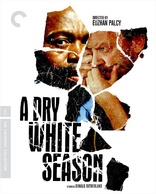
Movie rating
7.2 | / 10 |
Blu-ray rating
| Users | 3.5 | |
| Reviewer | 4.0 | |
| Overall | 3.5 |
Overview
A Dry White Season (1989)
Ben du Toit is a schoolteacher who always has considered himself a man of caring and justice, at least on the individual level. When his gardener's son is brutally beaten up by the police at a demonstration by black school children, he gradually begins to realize his own society is built on a pillar of injustice and exploitation.
Starring: Donald Sutherland, Janet Suzman, Zakes Mokae, Jürgen Prochnow, Susan SarandonDirector: Euzhan Palcy
| Drama | Uncertain |
| Thriller | Uncertain |
Specifications
Video
Video codec: MPEG-4 AVC
Video resolution: 1080p
Aspect ratio: 1.85:1
Original aspect ratio: 1.85:1
Audio
English: LPCM 2.0
Subtitles
English SDH
Discs
Blu-ray Disc
Single disc (1 BD)
Playback
Region A (locked)
Review
Rating summary
| Movie | 4.0 | |
| Video | 4.0 | |
| Audio | 4.0 | |
| Extras | 2.0 | |
| Overall | 4.0 |
A Dry White Season Blu-ray Movie Review
Reviewed by Jeffrey Kauffman March 6, 2020Marlon Brando is regularly cited as being the single finest actor of his generation, and at least one example of that perceived overarching excellence was his presence (figuratively if not always literally, as fans of one Sacheen Littlefeather may recall) at the Academy Awards, which ranged from 1952, when he scored his first nomination as Best Actor for A Streetcar Named Desire, to 1990, when he was feted for the last time in his long and legendary career as Best Supporting Actor in A Dry White Season. It may seem like “ancient history” now to younger readers in particular, but this anti-apartheid film was deemed so ostensibly “controversial” in its day that it was actually banned in South Africa for at least a while (the always questionable Wikipedia weirdly states it was banned and then states it opened in South Africa in 1989, which was the year of the film’s original release, while the at least relatively more reliable IMDb lists 1992 as the first South African screening of the film, which seems more believable to me personally). Brando is actually kind of on the sidelines in this story, as an activist attorney named Ian McKenzie who is hired by the film’s focal character, a white teacher named Ben Du Toit (Donald Sutherland) who gets sucked in the morass of apartheid almost by accident, and perhaps at least partially against his will.
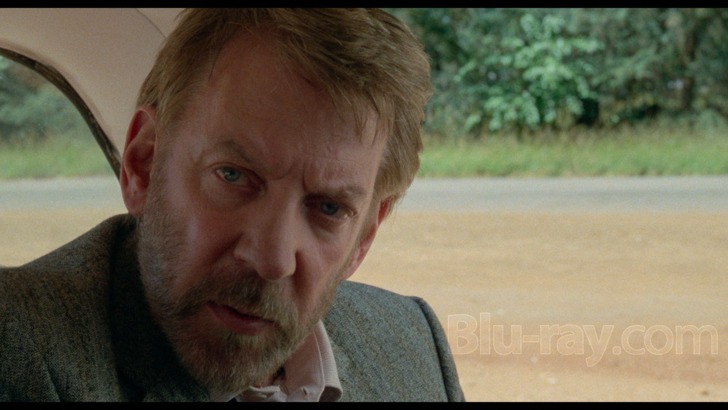
In a way, it might be just a little ironic that one of the advertising taglines for A Dry White Season stated, “One man has opened his eyes to the truth,” when the film itself pretty clearly documents that Ben, the “one man” in question, actually has his eyes opened for him, despite maybe wanting to keep them pretty tightly shut for at least a little while as the story unfolds. That’s actually one of the things that tends to work very well in this film, in that it shows a generally decent white man in South Africa who nonetheless may be kind of willfully blind to the social injustice and outright horror suffered by the black people in the troubled nation.
That perhaps unwanted “wokeness” comes courtesy of Ben’s black gardener, an unassuming man named Gordon Ngubene (Winston Ntshona), when Gordon shows Ben the rather shocking wounds Gordon’s very young son Jonathan (Bekhithemba Mpofu) suffered in police custody when Jonathan was swept up in some anti-riot activities on the part of the authorities. The fact that such a young child would have been arrested in the first place is kind of shocking, but the physical bludgeoning the young boy experienced moves this to a whole new, more disturbing, level. Rather interestingly, then, even this revelation doesn’t necessarily immediately stir Ben from his “comfort zone”, since he believes that the police are there to keep order and are basically honorable people just doing their jobs.
It’s only when Gordon disappears under mysterious circumstances that Ben’s trust in the powers that be starts to crumble. When a decidedly questionable answer is given as to what has happened to Gordon and his son (or at least one of them), Ben hires noted attorney Ian McKenzie (Marlon Brando) to fight an official conclusion as to the fate of one character, a task which even McKenzie knows is hopeless in South Africa’s “rigged” political system. The film takes something of a slight tonal break from its probably unavoidable depressive aspects during the court scenes, as Brando, if not chewing the scenery exactly, at least gets to indulge in some patently theatrical moments as McKenzie kind of archly puts the entire South African sociopolitical “order” on trial in an often disparaging way.
There have rightfully been any number of films documenting the history of racism in the United States, but at least in the case of our country it could be argued that we started to move in the right direction after the Civil War, even if there obviously continues to be monumental work that needs to be done to this day to fight this scourge. What’s so ultimately disturbing about A Dry White Season is how it shows a relatively modern society (1970s) that is engaging is such overt racism, with so many white people, including police (personified by a vicious character played by Jürgen Prochnow in the film), not just interested in preserving the status quo, but in physically punishing those who dared to fight for racial equality. That fight of course ends up consuming Ben, much to the detriment of his familial relationships, especially with his less than tolerant wife, Susan (Janet Suzman).
This is a film that doesn’t shirk from the oppressive horrors it wants to document, and as such, A Dry White Season is not always an “easy” watch, despite some of the florid tendencies from Brando in the middle part of the film. Performances are genuinely moving throughout the story, and if there’s not a traditional “happy” ending (how could there be?), there is at least a glimmer of hope as things resolve. Martin Luther King Jr. famously opined that "the arc of the moral universe is long, but it bends toward justice" (paraphrasing 19th century abolitionist Theodore Parker), and A Dry White Season’s dissection of this particular segment of that arc is often painful, but ultimately cathartic.
A Dry White Season Blu-ray Movie, Video Quality 
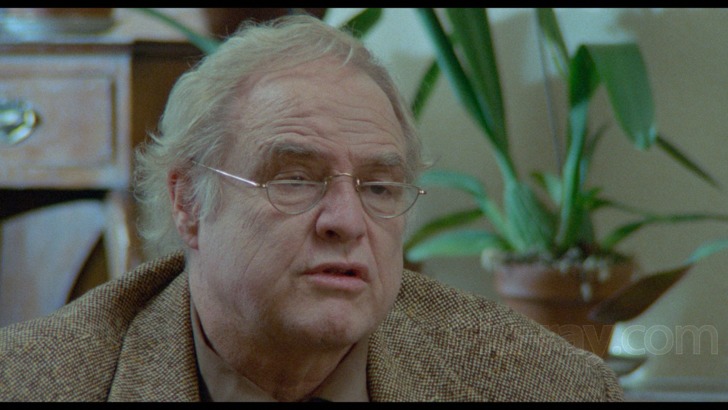
A Dry White Season is presented on Blu-ray courtesy of The Criterion Collection with an AVC encoded 1080p transfer in 1.85:1. In lieu of an insert booklet, Criterion includes a kind of accordion style foldout which contains the following information on the transfer:
A Dry White Season is presented in its original aspect ratio of 1.85:1. Black bars at the top and bottom of the screen are normal for this format. This new digital transfer was created in 4K resolution on a Lasergraphics Director film scanner from the 35 mm original camera negative. Thousands of instances of dirt, debris, scratches, splices, and warps were manually removed using MTI Film's DRS, while Digital Vision's Phoenix was used for jitter, flicker and small dirt.Detail levels and palette saturation are typically excellent throughout this presentation. Fine detail on elements like Ben's natty suit jackets or (more troublingly) the wounds suffered by some victims can be almost palpable at times. There's very little if any intentional grading in the film, and any changes in tonal qualities tend to result from lighting regimens. The outdoor material here pops best, as should probably be expected, with nicely vivid primaries. There are some curious variances in color temperature that show up from time to time (the first scene introducing Brando is a notable example). Grain is pretty gritty looking throughout this presentation and occasionally can add a kind of sickly yellow ambience to scenes (see screenshot 19, which is not an optical). My score is 4.25.
The original stereo soundtrack was remastered from the 35 mm magnetic track. Clicks, thumps, hiss, hum, and crackle were manually removed using Pro Tools HD and iZotope RX.
A Dry White Season Blu-ray Movie, Audio Quality 
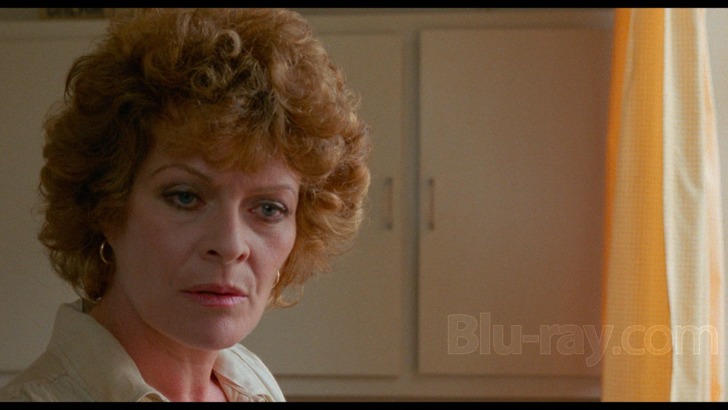
A Dry White Season features a nice sounding LPCM 2.0 track (see Criterion's verbiage on the provenance of the track above in the video section). The film does have a lot of fairly "talky" moments, where dialogue is rendered cleanly and clearly, but there are also some more calamitous crowd scenes where the rabble of large groups is well rendered. Dave Grusin provides a rather uncharacteristically minimalist score, and there are some wonderful source cues courtesy of Ladysmith Black Mambazo which sound great (sadly the only soundtrack CD available omits the Ladysmith Black Mambazo songs, I assume for licensing reasons).
A Dry White Season Blu-ray Movie, Special Features and Extras 
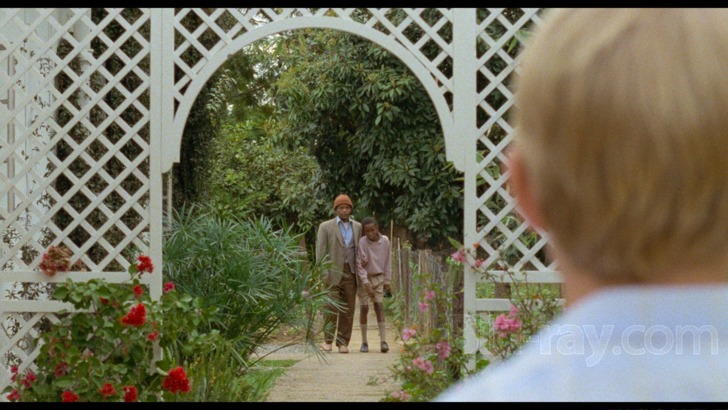
- Euzhan Palcy and Scott Foundas (1080p; 34:52) is a really interesting and at times kind of shocking discussion between the film's director and critic Foundas, where she gets into not just the filming but the political climate of the era.
- Five Scenes (1080p; 28:45) offers Euzhan Palcy again, here discussing five sequences in the film.
- Nelson Mandela (1080i; 2:43 ) is a brief but moving 1995 interview with the legendary leader conducted by Euzhan Palcy.
- Donald Sutherland (1080i; 5:22) is a 1989 interview with the actor culled from The Today Show.
- Award Ceremony (1080i; 1:30) is a brief snippet from the 2017 South African National Order of the Companions of O.R. Tambo Awards, featuring Euzhan Palcy being feted for her anti-apartheid activism.
A Dry White Season Blu-ray Movie, Overall Score and Recommendation 
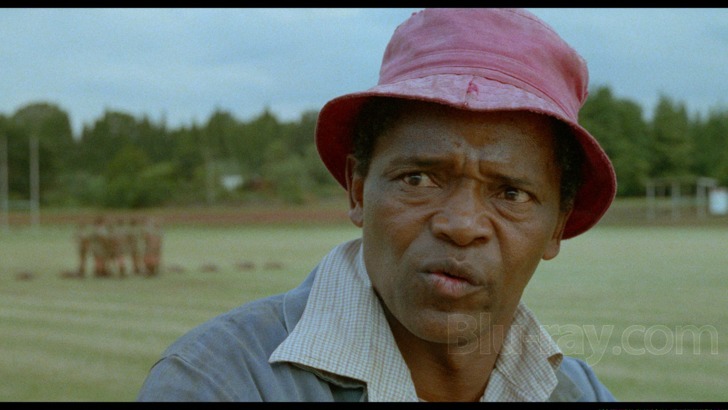
A Dry White Season may strike some as a historical curiosity, but it's really rather recent history, and as such may be both a salient warning about how badly blacks were treated in South Africa, but also perhaps a bit of a prophetic statement that things can indeed change. There's some unabashedly disturbing material here, but the film does a rather remarkable job of getting its points across without seeming like it's engaging in a screed. Technical merits are generally solid, and the supplements, while not bounteous, are also informative. Recommended.
Similar titles
Similar titles you might also like

Music Box
1989

Sorry We Missed You
2019

Syriana
2005

The Third Murder
三度目の殺人
2017

The Insult
L'insulte
2017

Lipstick
1976

Interrogation
Przesłuchanie / Slipcover in Original Pressing
1989

The Confession
L'aveu
1970

State of Siege
État de siège
1972

Mississippi Masala
1991

Rendition
2007

Judgment at Nuremberg
1961

The Story of Temple Drake
1933

The Naked Prey
1965

Daniel
1983

The Evil That Men Do
1984

Kiss of the Spider Woman
Collector's Edition
1985

Aquarius
2016

Taxi
2015

Viva la muerte
Long Live Death | Limited Edition
1971